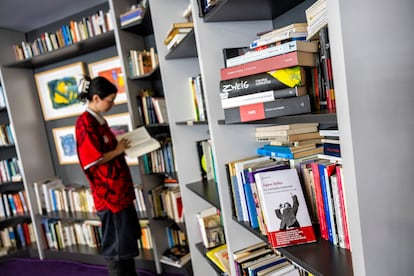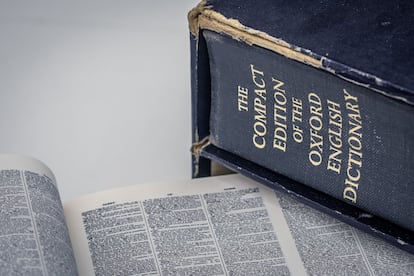In a place in La Mancha. In a village of La Mancha. In a town in the Channel. In a place of the Mancha. And so in more than one hundred and forty languages in which you can read the QuixoteMiguel de Cervantes’s immortal work. That Cruce Border literature is the valuable work of the translators, the same they have been doing hundreds of years. Thanks to this, characters like Alonso Quijano, Dr. Frankenstein and his creature, Hamlet, Emma Bovary, Anna Karénina, Fray Guillermo de Baskerville or Gregor Samsa are known outside the countries where they were conceived. Without translators there would be what is called “universal literature”, but sometimes it seems to forget that translators are also creators. One translation is never equal to another. There are words that are chosen or discarded, unique breaths in the score, a rhythm, a style that is typical of the translator or the translator and that is incorporated into the author of the work. With the development of generative artificial intelligence, translators see their work at risk and denounce that their work is being used for the “training” of AI programs without their permission, without respecting their authorship rights and contravening European regulations on intellectual property.
Palencia hosts on April 4 and 5 the IV Professional Meeting of the editorial translation. A prominent issue in these days is the defense of translators authorship against the illicit uses that are taking place with the generative AI on the part of companies and even public institutions. The meeting is organized by Ace Translator, an association constituted in 1983 for the protection and support of the translation sector, and the Spanish Reprographic Rights Center (CEDRO), whose objective is to protect authorship rights.
“The translator has the author’s consideration. He is not the author of an original work, but of a derived work, but is as author at the legal level as the writer,” says Javier Díaz de Olarte, legal director in Cedro, who will participate in the Palencia meeting. Olarte recalls that the European legal framework in the field of intellectual property is based on the European Directive of Copyright, which adapted these rights to the digital environment. In 2019 there was another directive, the copyright in the single digital market, which introduced some modifications, but the base remains that of 2001 and, in the Spanish field, the Intellectual Property Law, in which the author is recognized by exclusive rights of reproduction, distribution, public communication and transformation. “Any use, either if it develops in the environment of artificial intelligence or outside it, has to adapt to this general legal framework. That means that authorization is needed by the author. And this is not being fulfilled. As far as we know, no one has requested authorization in the different international or Spanish projects of ia that are being developed,” says Díaz de Olarte.
Among the modifications incorporated in 2019 the copyright directive in the single digital market was a limit or exception that is very cited lately, that of “data mining”. This limit allows is the massive treatment of works to obtain statistical results, either for scientific research or to observe variables and trends. If it is for the first, the rights holder cannot oppose; For any other type of use, it does have that possibility. The problem is that this data mining is being used for the training of AI without knowledge or authorization of the authors, including translators. “In certain environments it is said that data and text mining allows the training of AI systems, but in my opinion it is not so. It is necessary to mark on the one hand what is data and text mining and, on the other, what is the training of AI. Data mining is not intended to train a machine and much less to train a machine that can later produce something similar to a human creation and that can compete with a human creation. And the other is industrial production.
Marta Sánchez-Naves, a translator of Russian literature-of authors such as Tolstói, Dostoevski, Gógol and Ajmatova to contemporary writers such as Anna Starobinets-and also president of Ace Translators, recognizes the concern of the sector for the developments of the generative AI. “What worries most is the elimination of jobs. A few months ago there was already the case of a book that was published translated with the Spanish and there was controversy because not even the author of the original work knew it and it bothered her a lot. And the author is also of the US; The book is Coffee with pumpkin aromaby Laurie Gilmore, published in January of this year by Harpercollins. After the opposition of the author and the stir in social networks by booktokers That they had received the first copies of the book, the publisher decided to have a translator for the next edition.
Sánchez-Nieves reveals that Spanish translators are receiving more and more proposals for the position of books whose first translation suspects that it has been carried out with artificial intelligence. “It is being offered to edit books that do not tell you if they are translated by a person or by artificial intelligence. When you ask sometimes they tell you that it is made by a human translator, but when you see the text it is already clear to you that no.” On the other hand, in editorial contracts clauses are being incorporated by which translators undertake not to use the work. “And it seems very good to us, but we want it to be reciprocal, and that there are clauses in which the publishers also commit to not giving the translation we make for the use of AI,” claims Sánchez-Naves.
The Collegiate Association of Writers (ACE), of which oil translators is an autonomous section, announced earlier this year the results of a survey between Spanish authors – writing, translators and playwrights – about artificial intelligence. The main result was that 96.5% of the creators demanded that their consent be requested in the event that their works would like to be used for the training of generative AI models. The survey also participated by writers of Catalonia, Galicia, Euskadi, Valencia, Extremadura, Aragón, Castilla La Mancha, Navarra, Cantabria, Canarias, Asturias and La Rioja, in addition to the Association of Scientific-Technical and Academic Authors (Act).

“From ACE and the other promoting entities, the principle of authorization, remuneration and transparency (art), adopted by the European Writers’ Council (a Federation of Authors Associations) is defended as an essential framework for any use of protected works,” claimed the promotion associations of the study. The problem is that these principles are already breaking, which has begun to cause demands such as the one presented in France against the goal, in mid -March, by associations of editors and authors due to the massive use and without authorization of their works for the training of models of generative the AI.
In Spain, criticism has unleashed the Alia project, promoted by the Government and developed by the Barcelona Supercomputing Center. ALIA is a public infrastructure of artificial intelligence resources, such as open language models, even for use by third parties for commercial purposes, and trained in co -official languages: Catalan, Galician, Basque and Valencian. Alia was announced by the president of the Government, Pedro Sánchez, at the end of January. “In the elaboration of these language models, as far as we know, no authorization has been requested from any of the law holders. And that from the public sector is especially worrying,” says Díaz de Olarte. The legal director of Cedro points out that other countries, such as Norway or Denmark, “have adopted much more respectful of copyrights” in their government projects on AI and are talking with authors and editors to ensure the protection of their intellectual property rights. However, the Spanish Ministry of Culture did withdraw in January the processing of the Royal Decree of Licensing for the generative AI in order to initiate a process of dialogue with the cultural sector, which is already being produced.
In general, creators feel that their rights are neither respected or protected. Hence the rejection that has just been manifested before the third draft of the Code of Good Practices of the General Purpose AI (GPAI), made by the EU. This draft oppose the main European associations of audiovisual, theatrical and musical production, as well as organizations of journalists, screenwriters, actors, photographers and visual artists, in addition to the Federation of European editors, the European Council of Writers and the European Council of Literary Translators Associations (CEATL), which groups 36 associations from 28 countries, representing about ten thousand literary translators.
“There were high hopes that later remained in the European artificial intelligence regulations,” says Díaz de Olarte. “The Code of Good Practices starts from there. The Artificial Intelligence Regulation is more like a consumption standard than to something else. It only has three minimal references to intellectual property rights. It is a rule that is entering into force in parts, in August the majority will do in August time”.
Carlos Fortea, writer, German translator of authors such as Stefan Zweig, Thomas Mann, Kafka and Günter Grass, as well as professor of the Degree in Translation and Interpretation at the Complutense University of Madrid and National Translation Award in 2023 by Effinger. A Berlin sagaby Gabriele Tergit, considers that there are two fundamental issues: one of ethical and one aesthetic. “On the one hand, there is uncertainty and, in some cases, the founded suspicion and even proof that the published translations are being used to train artificial intelligence without the permission of the authors and without adequate regulation by that use. That is, we are attending a massive act of intellectual piracy tolerated by the authorities under the pretext of not having regulation.”
“On the other, there is a matter of aesthetic order, that is, in what affects translation as literary creation: if the editorial sector considers that readers continue to deserve a high quality product, then there is no reason for the current system to be replaced by another based on AI.” Fortea emphasizes that we must respect “the rights of readers and, so to speak, the rights of literature.” And he explains it: “We cannot go to standardized products, which flatten language, lacking innovation, because artificial intelligence only squeez If I have to talk about modern architecture or modern architecture.

